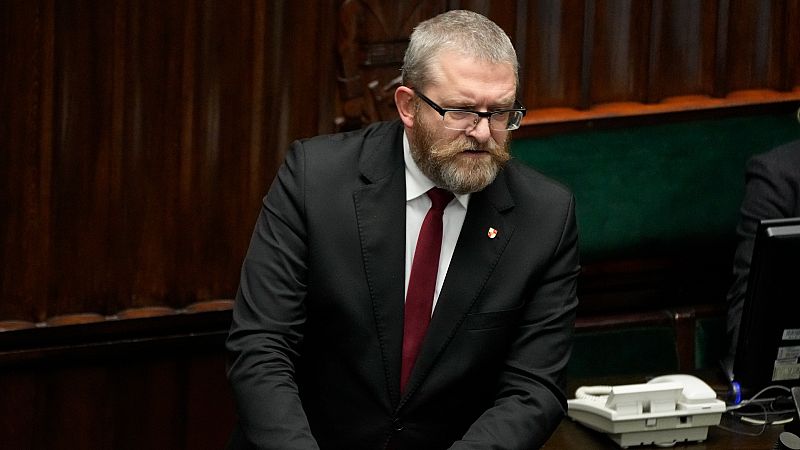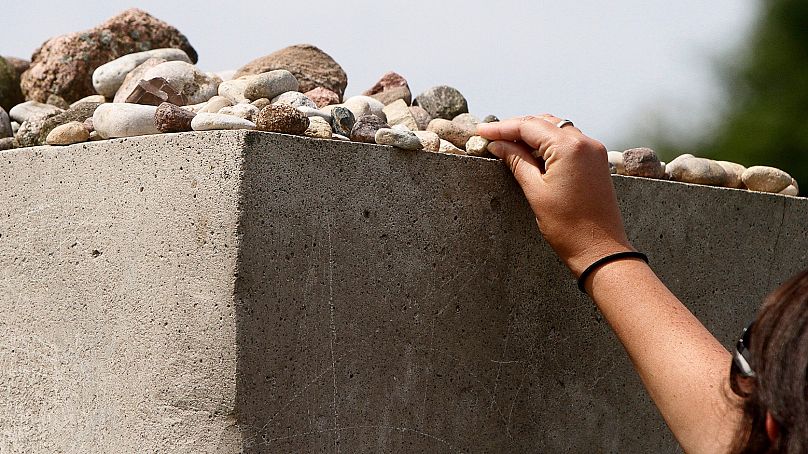
Polish prosecutors have launched a criminal investigation after a far-right lawmaker and MEP described the Auschwitz concentration camp and its gas chambers as "fake".
Grzegorz Braun, a member of the far-right Confederation party and former presidential candidate, is under investigation for the "public and factually untrue denial of the crimes of genocide" committed by Nazi officers at Auschwitz, prosecutors said on Monday.
The probe relates to an interview with Braun on Poland’s Wnet radio last week, according to the Commission for the Prosecution of Crimes against the Polish Nation.
During that interview — which was broadcast on 10 July — Braun said the Nazi death camp and its gas chambers were "fake" and accused the government-run Auschwitz Museum of promoting a "pseudo-historical narrative". The reporter immediately ended the interview after Braun's remarks, saying that he had gone too far.
The prosecutors' investigation comes under Article 55 of the Polish Act on the Institute of National Remembrance, which punishes Holocaust denial by up to three years in prison.
Auschwitz Museum Director Piotr Cywiński was one of several figures and institutions in the country to criticise Braun and demand action against him.
"Denying the fact that gas chambers existed is not only a manifestation of anti-Semitism and an ideology of hatred; in Poland it is also a crime," Cywiński said in a statement shared on Facebook. He also said that the museum would sue Braun for defamation.
'A disgrace'
Polish Prime Minister Donald Tusk described Braun’s words as "a disgrace", and said that "we must do everything so that no one in the world associates Poland with such people, such faces and such actions".
Nazi German forces systematically imprisoned, tortured and murdered about 1.1 million people at Auschwitz in southern Poland, which was under German occupation during World War II.
Most of the victims were Jews killed on an industrial scale in gas chambers, but also Poles, Roma, prisoners of war, members of antifascist resistance, gay people and others.
On Thursday, Braun visited the northeastern town of Jedwabne on the anniversary of a 1941 massacre in which at least 340 Jews were killed, some burned alive.

Braun was among a group of people who tried to block the departure of cars carrying people who participated in a ceremony marking the anniversary, including Poland’s chief rabbi, local media reported. Police intervened and they were able to leave.
Some Poles want the massacre site excavated to uncover possible evidence that Germans ordered Polish villagers to do the killings. Braun demanded the exhumation of the victims on Thursday.
Braun has a history of contentious and provocative behaviour.
In December 2023, he used a fire extinguisher to douse Jewish Hanukkah candles in parliament, an act that sparked global outcry.
Over the years, Braun has also damaged a microphone during a talk by a Holocaust historian, vandalised an LGBTQ+ exhibition, and removed a Christmas tree from a court in Krakow and put it in the bin because it was decorated in pro-Ukrainian and pro-EU colours.
.jpg?w=600)






